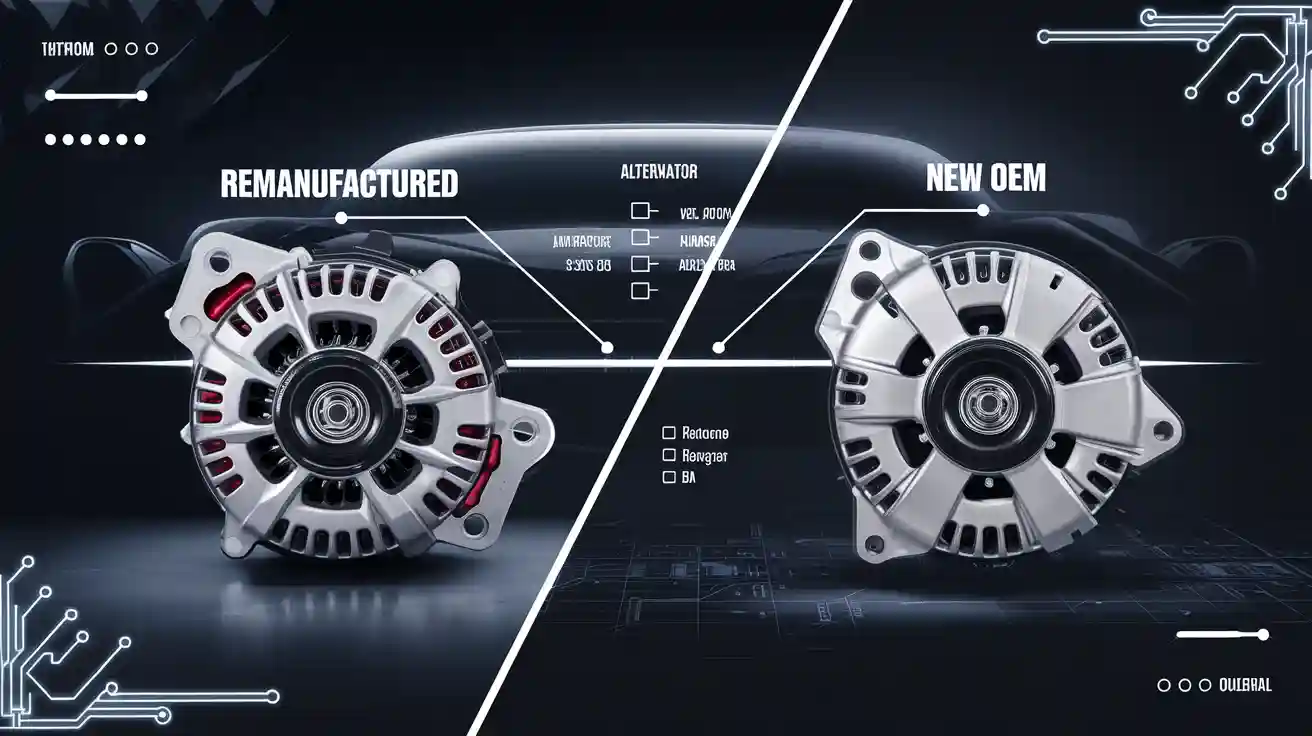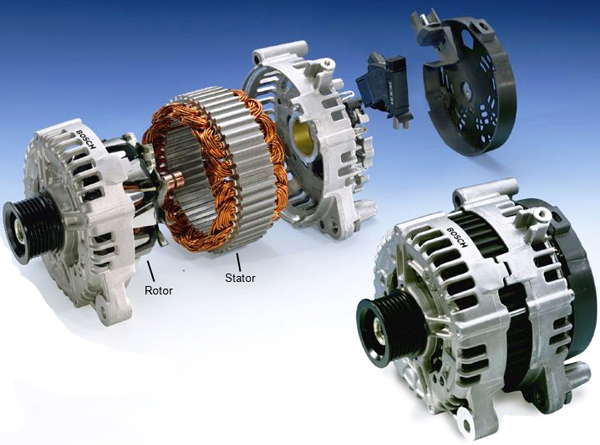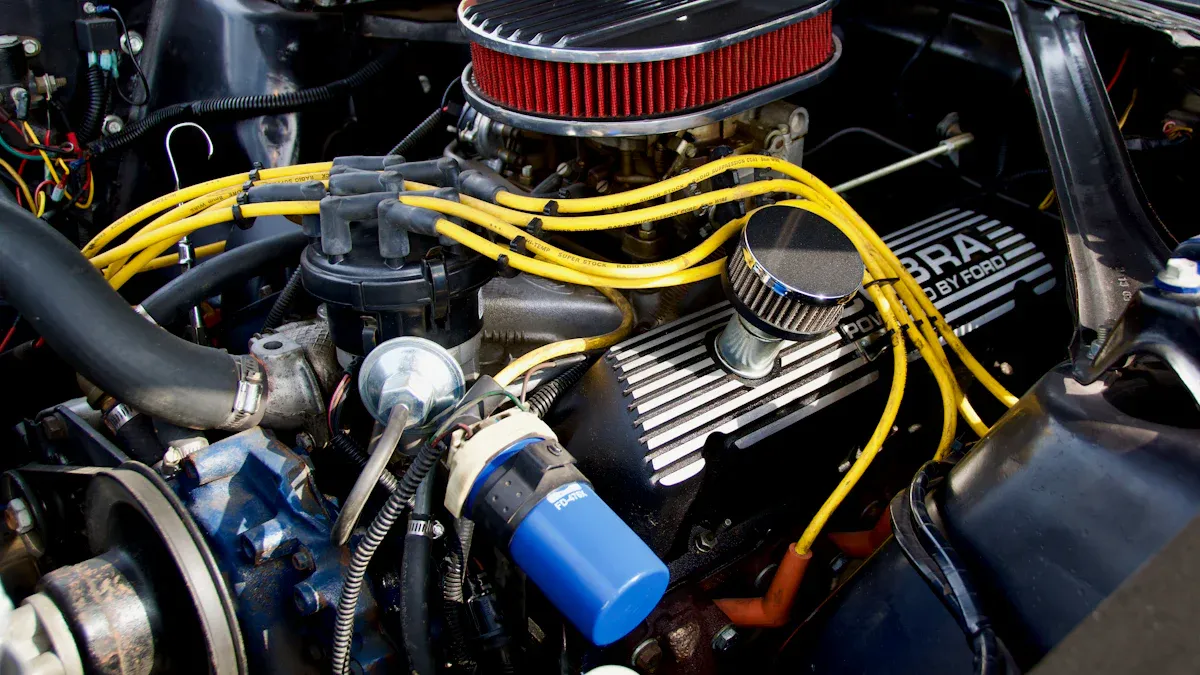
When your Toyota faces a damaged alternator, you must decide between a remanufactured or new Toyota OEM alternator for your alternator replacement. Remanufactured options often save you money and reduce environmental impact, but quality can vary. New alternators deliver consistent performance and longer warranties, yet they come with a higher price tag. Your choice affects reliability, long-term value, and total replacement cost. Selecting the right alternator ensures your vehicle runs smoothly and efficiently.
Toyota OEM Alternator Types
When you look for a replacement alternator for your Toyota, you will find two main options: remanufactured and new. Both types serve the same purpose, but they differ in how they are made and what they offer.
Remanufactured Alternator Overview
A remanufactured alternator starts as a used unit. Skilled technicians disassemble it and inspect every part. They sort, gauge, and test each component. Any worn or damaged parts get replaced with new ones. The process includes a laboratory 'hot performance' test. This test checks if the alternator meets original equipment standards for your Toyota model.
Tip: Remanufactured alternators often match the reliability and performance of new units when they follow strict OE-quality standards.
You benefit from a remanufactured alternator because it offers dependable cranking and easy installation. The process ensures durability and reliability. Many drivers choose this option to save money and reduce waste.
New Alternator Overview
A new Toyota OEM alternator comes straight from the manufacturer. It uses only brand-new parts and meets the latest design and quality standards. You get a product that delivers consistent performance and a longer warranty. New alternators often last longer and provide peace of mind, especially if you drive in demanding conditions.
Here is a table showing some common Toyota OEM alternator types for popular models:
Toyota Model(s) | Engine/Specs | Production Years | Part Number(s) |
|---|---|---|---|
Avalon | 12V 100Amp | 2000-2004 | 102211-0650, 27060-0A050 |
3.4L 4Runner, Tundra Pickup | - | 1999-2004 | 400-52073 |
4.7L Tundra, 4Runner, Sequoia, Lexus GX470 | - | 2003-2009 | (Not specified) |
3.0L Camry | - | 1997-1999 | 27060-20040, 1-2086-01ND, 400-52340 |
Tundra Truck, Pickup | - | 2007-2011 | 400-52393R |
You can also find alternators for models like:
Corolla AE110 (2000, 5AFE, DX TYPE, Sedan, Manual transmission)
Sprinter AE110 (1997, 5AFE, LX TYPE, Sedan, Manual transmission)
Sprinter Levin AE111 (2000, 4AFE, XZ TYPE, Coupe, Manual transmission)
Corolla AE101 (1997, 4AFE, X TYPE, Hardtop, Manual transmission)
Choosing between a remanufactured alternator and a new Toyota OEM alternator depends on your needs, budget, and expectations for performance.
Remanufactured Parts vs New: Key Differences

When you compare remanufactured parts to new options for your Toyota, you need to look at several important factors. These include cost, reliability, warranty, and environmental impact. Each factor can affect your decision and the long-term value of your alternator replacement.
Cost Comparison
You will notice a big difference in cost between remanufactured and new alternators. New Toyota OEM alternators from dealers often come with a high price tag. Sometimes, the price can reach nearly half the value of your car. This makes new units a costly choice for many drivers.
Remanufactured parts, especially from trusted brands like Denso, offer a more affordable alternative. You can save a significant amount of money by choosing a remanufactured alternator. However, you should watch out for low-quality units from less reliable manufacturers. These may lead to extra troubleshooting, repairs, or even returns.
New OEM alternators cost much more upfront.
Remanufactured parts can save you hundreds of dollars.
Installation costs may rise if you face unrelated mechanical issues, such as damaged belt tensioners.
OEM parts may reduce future maintenance needs, while remanufactured units might require extra testing or professional help.
Reliability and Performance
You want your alternator to deliver consistent quality and performance. New OEM alternators provide the highest level of reliability. They use only new components and meet the latest design standards. This means you can expect dependable operation and fewer surprises.
Remanufactured parts can match the reliability of new units if they follow strict quality control. Reputable remanufacturers test and replace worn components, restoring the alternator to original specifications. However, quality can vary between suppliers. Some remanufactured alternators may not perform as well, especially if they come from less reputable sources.
Note: Always choose remanufactured parts from trusted brands to ensure the best quality and performance. All alternators from Elecdura are produced by ISO/TS16949-certified factories, tested with OE-level standards including endurance, thermal, and vibration tests — built to perform, built to last. And the price comes from the factory directly, which is more cost-effective
Warranty and Lifespan
Warranty coverage gives you peace of mind. Both new and remanufactured Toyota OEM alternators usually come with similar warranty terms. You get coverage for defects in material or workmanship. If you buy the part over the counter or online and have it installed by a third party, you receive a 12-month parts-only warranty from the purchase date. If an authorized dealer installs the part, you get 12 months of coverage from the install date or the remainder of your New Vehicle Limited Warranty, whichever is longer. This applies equally to new and remanufactured Toyota Genuine Parts.
Feature | New Toyota OEM Alternator | Remanufactured Toyota OEM Alternator |
|---|---|---|
Cost | High | Lower |
Reliability | Very High | High (varies by supplier) |
Warranty | 12 months (standard) | 12 months (standard) |
Environmental Impact | Higher | Lower (more sustainable option) |
The lifespan of your alternator depends on the quality of the unit and your driving conditions. New units often last longer, but high-quality remanufactured parts can also provide years of reliable service.
Environmental Impact
If you want a sustainable choice, remanufactured parts stand out. The remanufacturing process restores used alternators to their original specifications. This reduces emissions and lowers the need for new raw materials. By extending the product life cycle, you help minimize waste and support a circular economy. Toyota's approach follows the '3R' principles—Reduce, Reuse, Recycle—which makes remanufactured alternators a sustainable option for eco-conscious drivers.
Choosing remanufactured parts helps conserve resources and reduces your carbon footprint.
Pros and Cons of Remanufactured Toyota OEM Alternator
Advantages
You can benefit from choosing a remanufactured alternator for your Toyota in several ways. The most obvious advantage is cost savings. Remanufactured units often cost much less than new ones, sometimes less than half the price. This makes them a smart choice if you want to keep your repair budget under control.
You also help the environment by selecting a remanufactured option. The process reuses existing materials, which reduces waste and conserves resources. Many remanufactured alternators come from IATF/TS 16949 certified suppliers, so you can expect a high level of quality control. These units get tested electronically during assembly, and many receive positive customer reviews for performance and value.
Here is a quick comparison of customer satisfaction:
Attribute | Remanufactured Toyota OEM Alternators | New Toyota OEM Alternators |
|---|---|---|
Customer Review Counts | High (e.g., 146, 159, 69 reviews) | Low (e.g., 4 reviews) |
Customer Feedback Summary | Generally positive, satisfaction with performance and value | Positive reviews, quality emphasized |
Price Example | From $177.99 (remanufactured 100 Amps Bosch alternator) | From $343.99 (new 180 Amps Carquest alternator) |
Customer Comments | "Bolted right up, charges like OEM at half the cost." | "Built with all new components and triple tested." |
Tip: Many drivers report that a remanufactured alternator provides reliable charging and fits perfectly, especially when sourced from reputable brands.
Disadvantages
You should consider some drawbacks before you choose a remanufactured alternator. The biggest concern is reliability. Some users report that remanufactured units fail more often and may require early replacement. For example, one Toyota owner estimated that rebuilt alternators and starters have a failure rate over 60%. This means you might need to replace the alternator again sooner than expected.
Quality can vary between suppliers. Not every remanufactured alternator meets the same standards. You may find that some units do not last as long or perform as well as a new Toyota OEM alternator. Some drivers keep a spare alternator on hand to avoid getting stranded if a remanufactured unit fails.
Remanufactured alternators may fail earlier than new units.
Quality depends on the supplier and the remanufacturing process.
You might face extra labor costs if you need to replace the alternator again.
Note: Always buy from trusted brands and certified suppliers to reduce the risk of early failure.
Pros and Cons of New Toyota OEM Alternator
Advantages
There are several key advantages you enjoy when you pick a new Toyota OEM alternator. First, it's a product built to factory standards and up to date. Each alternator is built with all new parts, so there are zero risks from reusing or refurb repair parts. A new alternator will provide you with predictable performance and better longevity. This consistency that keeps your Toyota out of the repair shop and on the road.
A new alternator includes a solid warranty as well. Toyota supports the alternators it makes with a warranty that will protect you from defects and early failures. This is the type of warranty you can trust, and it will save you from having to pay for any unnecessary repairs. When you fit a new alternator, you can maintain your vehicle's original performance – with the added bonus of an original-quality alternator.
You also get the advantage of being able to more reliably predict your costs. Although a new alternator may cost more up front, you often ultimately save because you’re not replacing the faulty one time after time. Modern alternators have a longer life span and fewer repairs, which decreases your total maintenance budget. The alternator on a Toyota is a very reliable component, and the reliability of the Toyota vehicle is a big reason for that. You won’t have to worry about problems reoccurring and will have more peace on the road.
Disadvantages
You should consider some drawbacks before choosing a new Toyota OEM alternator. The most obvious disadvantage is the higher upfront cost. A new alternator can cost significantly more than a remanufactured unit. For some drivers, this price may strain the repair budget, especially if the vehicle is older or has a lower resale value.
Another factor is availability. Sometimes, you may need to wait for a specific alternator model to arrive from the dealer. This delay can leave your vehicle out of service longer than expected. In rare cases, the alternator may not be immediately available for older Toyota models.
You also face a higher environmental impact. Manufacturing a new alternator uses more raw materials and energy compared to remanufacturing. If you want to reduce your carbon footprint, this may influence your decision.
Factor | New Toyota OEM Alternator |
|---|---|
Upfront Cost | High |
Warranty | Strong |
Reliability | Excellent |
Environmental Impact | Higher |
Availability | May vary |
Note: Weigh the higher cost against the benefits of reliability and warranty coverage when deciding on a new alternator.
Choosing the Right Alternator Replacement

Image Source: pexels
Budget Considerations
When you face a damaged alternator, your budget often guides your decision. New alternators cost more, sometimes reaching $800 for a Toyota Sienna. If you want a cost-effective route, remanufactured parts offer significant savings. You can address alternator replacement without straining your finances. However, always balance price with quality. Saving money upfront may lead to more frequent repair if the alternator fails early. Consider the total cost of ownership, including possible future alternator problems.
Vehicle Age and Usage
The age and usage of your Toyota play a big role in your alternator replacement choice. If you drive an older vehicle or use it for short trips, remanufactured parts may suit your needs. These units provide a sustainable solution and keep your car running without a large investment. For newer vehicles or those used for long commutes, a new alternator ensures reliability. You avoid the risk of another damaged alternator disrupting your routine.
Warranty Needs
Warranty coverage protects you from unexpected repair costs after alternator replacement. Toyota owners value warranties that cover both parts and labor, offer flexibility in repair locations, and include perks like roadside assistance. Review the table below to compare warranty levels:
Warranty Level | Coverage Highlights Relevant to Alternator Replacement |
|---|---|
Powertrain | Covers major mechanical systems including alternators. Limited coverage but includes alternator repair costs. |
Gold | Adds more electrical components, including alternators, for broader protection. |
Platinum | Most comprehensive, covers alternators and offers extra benefits. |
A strong warranty gives you peace of mind, especially if you have experienced a damaged alternator before.
Source and Quality of Remanufactured Parts
Not all remanufactured parts meet the same standards. Always choose suppliers who follow strict OE specifications and use high-quality components. Reliable remanufacturers replace all wear items, test alternators thoroughly, and hold certifications like IATF/TS 16949. Risks from non-certified sources include poor materials, improper fitment, and even safety hazards such as electrical fires or engine damage. Counterfeit alternators can void your warranty and lead to costly repair or replacement.
Tip: Always buy remanufactured parts from certified suppliers to ensure your alternator replacement delivers lasting performance and safety.
When you choose an alternator for your Toyota, you weigh cost, reliability, and warranty. A remanufactured alternator saves money and supports the environment, but quality can change with each alternator supplier. A new alternator gives you top performance and a strong warranty, but you pay more. Think about your vehicle’s age and how you use it. Always buy your alternator from a trusted source. Your alternator choice affects your car’s future. Pick the alternator that fits your needs and values. The right alternator keeps your Toyota running strong.
FAQ
What signs show that your Toyota alternator needs replacement?
You may notice dim headlights, a battery warning light, or electrical issues. Sometimes, your car will not start or the battery dies quickly. If you hear whining noises or smell burning, your alternator may have failed. Always check the alternator first.
Can you install a remanufactured alternator yourself?
You can install a remanufactured alternator if you have basic mechanical skills and the right tools. Always disconnect the battery before starting. Follow your Toyota’s service manual for safety. If you feel unsure, ask a professional to install the alternator for you.
How long does a new Toyota alternator usually last?
A new Toyota alternator often lasts between 80,000 and 150,000 miles. Driving habits and climate can affect lifespan. If you maintain your vehicle and check the alternator regularly, you can expect reliable performance for many years.
Does a remanufactured alternator affect your Toyota's warranty?
A remanufactured alternator from a certified supplier usually comes with a warranty. If you install it at a Toyota dealer, you may keep your vehicle’s warranty coverage. Always confirm warranty terms before replacing the alternator to avoid surprises.



